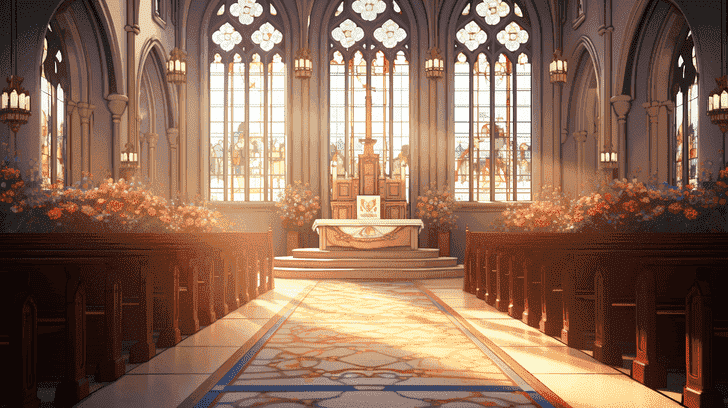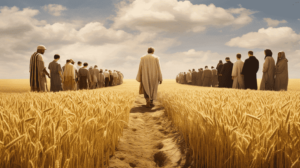When exploring the practices and beliefs surrounding the observance of the Sabbath in the Catholic Church, one question arises: what are the Catholic Sabbath rules?
The Catholic Sabbath is called the “Lord’s Day”, they say it holds great significance as it commemorates the resurrection of Jesus Christ and is celebrated with the Eucharist.
Catholics view Sunday as a day for assembly and worship and a day of rest from servile work. How biblical this teaching is, we will find out later on.
This article will delve into the Catholic Sabbath rules, exploring the historical context, teachings, and guidelines surrounding the Sabbath day.
“Sabbath” in Catholicism
One of the key rules regarding the Sabbath in Catholicism is the observance of a day of rest from servile work, traditionally observed on Sunday.
They say the significance of the Sabbath in Catholicism lies in its commemoration of the resurrection of Jesus, making it both the first day and the ‘eighth day’ of the week symbolizing first creation and new creation.
Catholics view Sunday as a day for assembly and worship. It’s also seen as a day of protest against the servitude of work and the worship of money.
However, the Bible does not teach anything about Sunday as being holy! The Sabbath is on the seventh day of the week, known today as Saturday! (see Exodus 20:8-11, and Luke 23:53-56).
Also, the resurrection of Jesus is not celebrated by establishing a new day of rest. Jesus never established such a thing! Instead, He instituted baptism as a remembrance of His death and resurrection! (Romans 6:3-5).
Nowhere in the New Testament, do we find a commandment to keep Sunday holy in remembrance of His resurrection!
To follow Jesus and His commandments is to read, understand, and obey the Scriptures, and not the traditions of man!
While many Catholic people are being honest in sincere in their faith, we will all be judged based on the Holy Scriptures, and not on traditions and doctrines of man!
God loves us so much, that He gave His only Son to die for our sins, and He does not want us to be deceived!
Catholic Stance and Commercial activity on Sundays
The Catholic stance on commercial activity on Sundays is that it should be avoided, with activities like public trade, shopping, and buying and selling being prohibited.
The Catholic Church says that the impact of the resurrection on the Sabbath highlights the transformative nature of Sunday as a day of rest and worship.
The “Significance” of the Resurrection on Sunday
The Resurrection of Jesus holds profound theological implications for Catholics and is a central event in biblical interpretation.
The resurrection symbolizes the triumph over sin and death, and the establishment of a new covenant between God and humanity, they say.
This historical context gives Sunday a unique religious practice in Catholicism, as it becomes a day to commemorate and celebrate the Resurrection.
The cultural significance of Sunday as a day of rest and worship is deeply ingrained in the Catholic tradition, with the faithful gathering for Mass and engaging in spiritual reflection.
This observance of Sunday highlights the importance of the Resurrection and its impact on the faith and lives of Catholics.
Yet, again, as we mentioned above, when we search the Scriptures, there is no commandment anywhere in the New Testament to keep Sunday holy.
I challenge everyone who reads this post, who is accustomed to worship on Sunday, to search the New Testament for biblical evidence that we are to do so.
Observing a Day of Rest or the Day of Rest?
Catholics are required to observe a day of rest from servile work. This practice emphasizes the importance of rest and the need to balance work and rest in one’s life.
Observing a day of rest has numerous spiritual benefits, such as deepening one’s relationship with God, fostering gratitude, and promoting inner peace.
God already established this day of rest, and is the only one that has been sanctified and blessed by the Lord!
Remember the sabbath day, to keep it holy.
Six days shalt thou labour, and do all thy work:
But the seventh day is the sabbath of the LORD thy God: in it thou shalt not do any work, thou, nor thy son, nor thy daughter, thy manservant, nor thy maidservant, nor thy cattle, nor thy stranger that is within thy gates:
For in six days the LORD made heaven and earth, the sea, and all that in them is, and rested the seventh day: wherefore the LORD blessed the sabbath day, and hallowed it.
Exodus 20:8-11 KJV
The Sabbath is on the seventh day, Saturday, and cannot be any other day according to the Scriptures!
The rest weekdays are normal working days, but the seventh day has been blessed and sanctified by God!
You see why it’s important to choose the day of rest, and not “a day of rest?”
Forbidden Activities on Sundays and Holy Days
The Catholic Church says that on Sundays and holy days, Catholics are prohibited from engaging in certain activities. These restrictions are in place to honor the “Catholic Sabbath” observance and show reverence for these special days.
According to the Church, Sunday activities should be centered around worship and rest. This means that Catholics should refrain from engaging in servile work, which includes activities such as plowing, sewing, and commercial trading.
The 1917 Code of Canon Law specifies that on feast days of precept, Mass must be attended and servile work, legal acts, and public buying and selling are to be abstained from.
The purpose of these “holy day” regulations is to create a space for Catholics to focus on spiritual reflection and rejuvenation. By observing these guidelines, Catholics can fully embrace the significance of Sundays and holy days as sacred moments in their faith.
Again, one must decide if he follows the Bible or the teachings of man. The Bible says it is the Word of God and the ultimate truth! (2 Timothy 3:15-16), (John 17:17).
Conclusion
In conclusion, the “Catholic Sabbath” rules hold great significance in the Church’s teachings and practices.
The observance of the Sabbath, called by the Church “the Lord’s Day”, is a time for assembly, worship, and rest from servile work. Catholics view Sunday as a symbol of both the first creation and the new creation, commemorating the resurrection of Jesus Christ.
The Church provides guidelines regarding prohibited activities on the Sabbath, emphasizing the importance of taking time to rest both mind and body.
Unfortunately, there is no such thing as Sabbath on Sunday in the Bible. Also, the Word of God also tells us which is the Lord’s day, which the Catholic Church incorrectly calls it Sunday, based on their interpretation.
Isaiah 58:13 If thou turn away thy foot from the sabbath, from doing thy pleasure on my holy day; and call the sabbath a delight, the holy of the LORD,…
Mark 2:28 Therefore the Son of man is Lord also of the sabbath.
Therefore, according to the above verses the Lord’s day is the Sabbath. Which day is the Sabbath? The seventh day! (Exodus 20:10)
God winks at our times of ignorance, but He expects us to read and search the Scriptures for ourselves, and to not let our salvation in the hands of another human being, whether priests or popes. (Acts 17:30)
References
Holy Bible KJV
My Letter To A Sunday Keeper – Sabbath Documentary

The Days of Noah – Powerful Documentary (Video Format)

Bible Studies – Written Format







